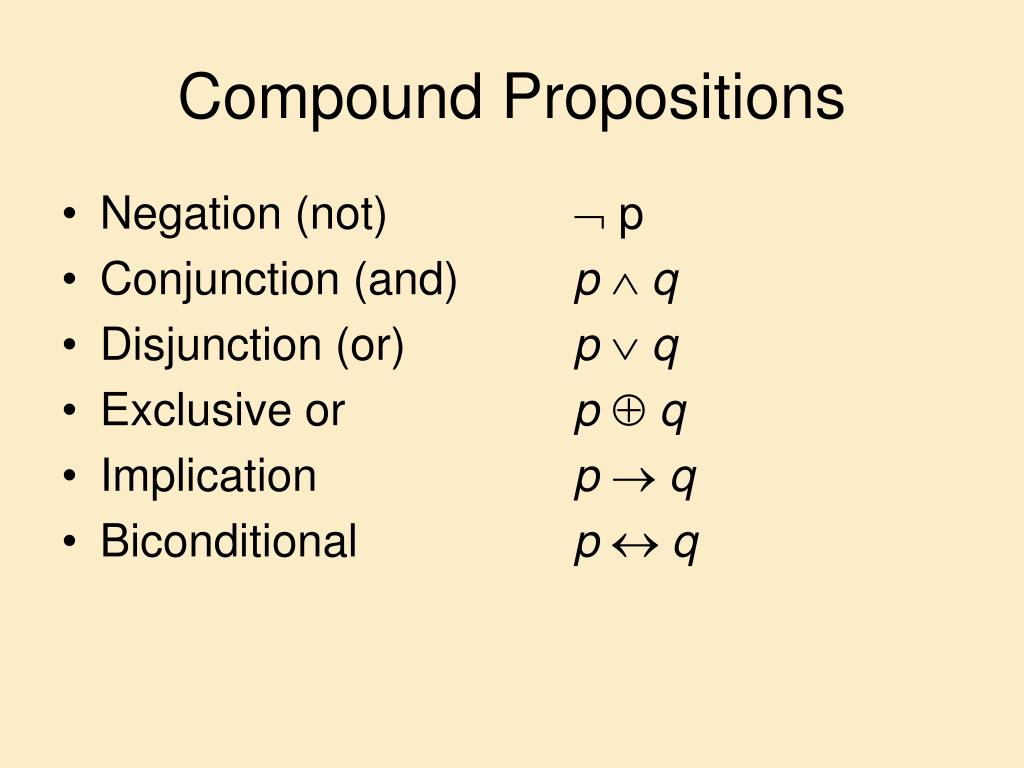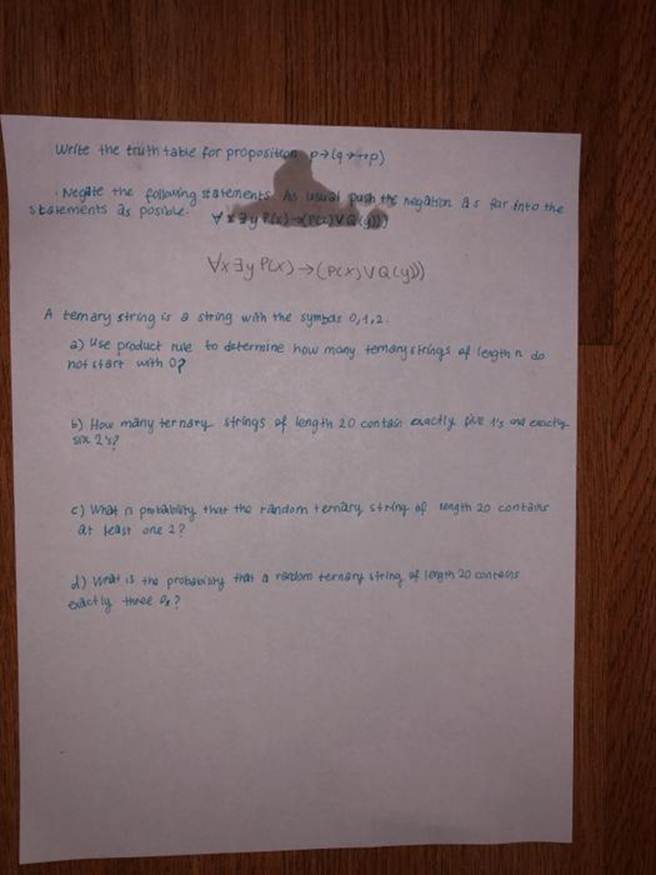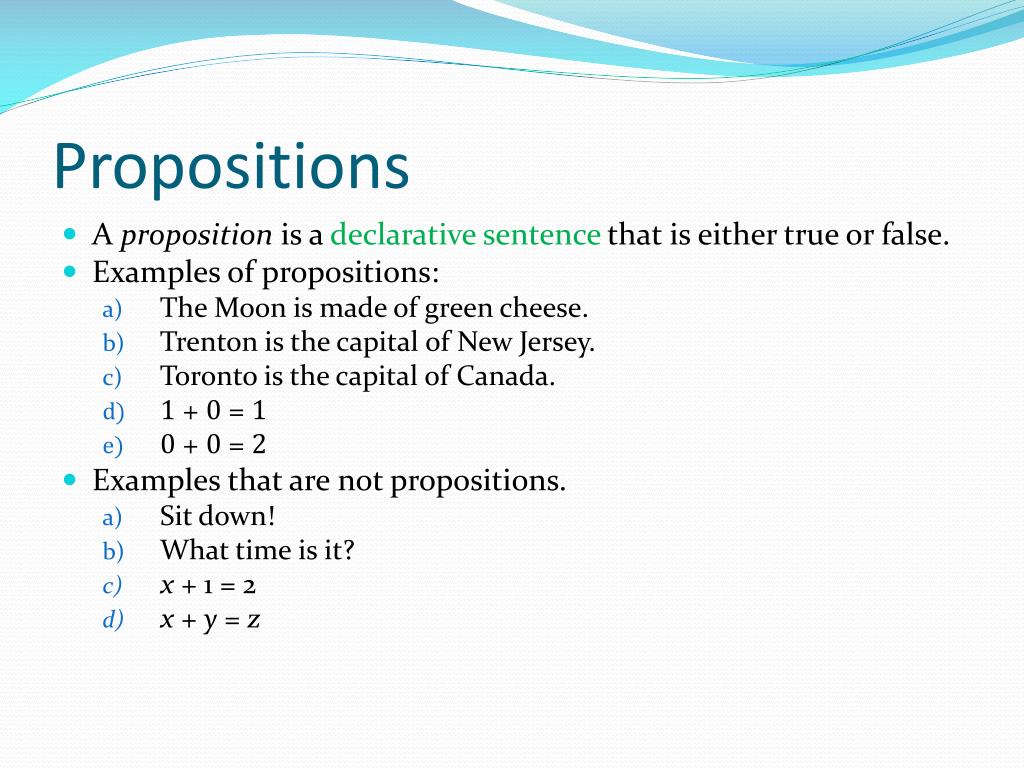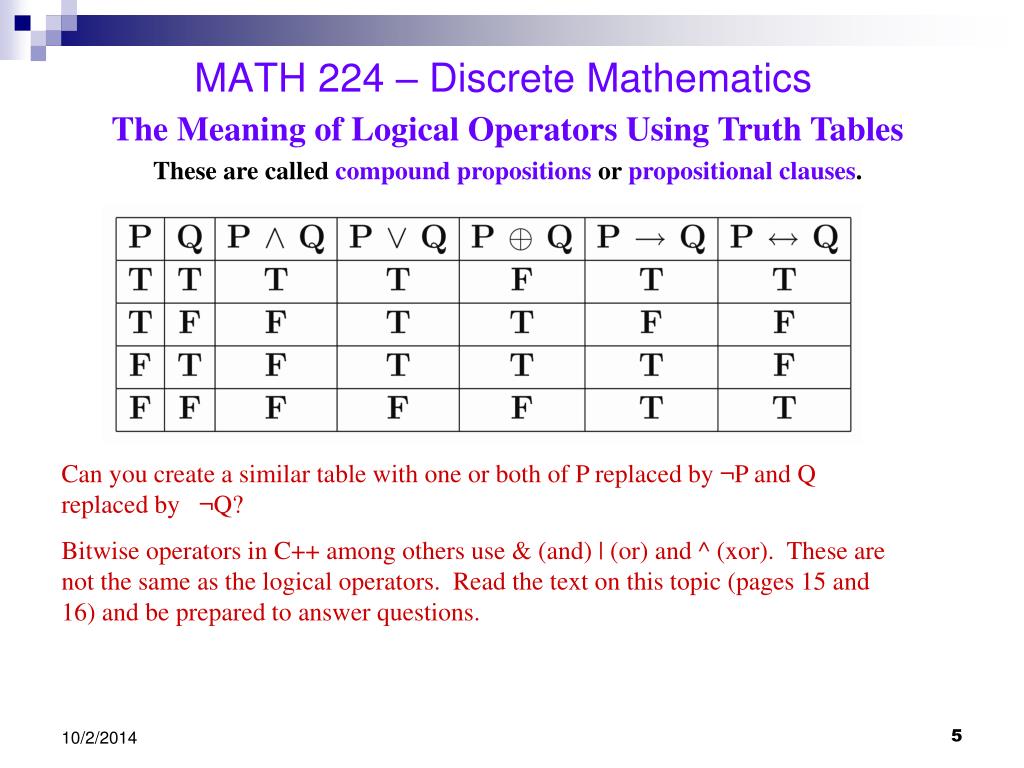Proposition Discrete Math
Proposition Discrete Math - To describe any formal language precisely, we need three pieces of information | the alphabet describes the symbols used to write down the sentences in. For each of the following propositions, identify simple propositions, express the compound proposition in symbolic form, and determine. We define a proposition (sometimes called a statement, or an assertion). We change that by introducing logical operators (also called logical connectives) with which we can build up compound constructions. In mathematics, we are interested in statements that can be proved or disproved.
In mathematics, we are interested in statements that can be proved or disproved. We change that by introducing logical operators (also called logical connectives) with which we can build up compound constructions. For each of the following propositions, identify simple propositions, express the compound proposition in symbolic form, and determine. We define a proposition (sometimes called a statement, or an assertion). To describe any formal language precisely, we need three pieces of information | the alphabet describes the symbols used to write down the sentences in.
We define a proposition (sometimes called a statement, or an assertion). To describe any formal language precisely, we need three pieces of information | the alphabet describes the symbols used to write down the sentences in. For each of the following propositions, identify simple propositions, express the compound proposition in symbolic form, and determine. In mathematics, we are interested in statements that can be proved or disproved. We change that by introducing logical operators (also called logical connectives) with which we can build up compound constructions.
proposition in discrete mathematics logic gate operations by
To describe any formal language precisely, we need three pieces of information | the alphabet describes the symbols used to write down the sentences in. We change that by introducing logical operators (also called logical connectives) with which we can build up compound constructions. In mathematics, we are interested in statements that can be proved or disproved. For each of.
PPT Discrete Mathematics PowerPoint Presentation, free download ID
In mathematics, we are interested in statements that can be proved or disproved. We change that by introducing logical operators (also called logical connectives) with which we can build up compound constructions. To describe any formal language precisely, we need three pieces of information | the alphabet describes the symbols used to write down the sentences in. We define a.
What Does A Capital X Mean In Texting Exemple de Texte
In mathematics, we are interested in statements that can be proved or disproved. For each of the following propositions, identify simple propositions, express the compound proposition in symbolic form, and determine. We define a proposition (sometimes called a statement, or an assertion). To describe any formal language precisely, we need three pieces of information | the alphabet describes the symbols.
(Get Answer) Write the truth table for following proposition
For each of the following propositions, identify simple propositions, express the compound proposition in symbolic form, and determine. In mathematics, we are interested in statements that can be proved or disproved. To describe any formal language precisely, we need three pieces of information | the alphabet describes the symbols used to write down the sentences in. We change that by.
Lec 01 proposition (Discrete Mathematics)
For each of the following propositions, identify simple propositions, express the compound proposition in symbolic form, and determine. In mathematics, we are interested in statements that can be proved or disproved. We define a proposition (sometimes called a statement, or an assertion). To describe any formal language precisely, we need three pieces of information | the alphabet describes the symbols.
Discrete Mathematics Chapter 1 Logic and proofs 1282020
To describe any formal language precisely, we need three pieces of information | the alphabet describes the symbols used to write down the sentences in. We change that by introducing logical operators (also called logical connectives) with which we can build up compound constructions. For each of the following propositions, identify simple propositions, express the compound proposition in symbolic form,.
PPT Discrete Mathematics Math 6A PowerPoint Presentation, free
In mathematics, we are interested in statements that can be proved or disproved. For each of the following propositions, identify simple propositions, express the compound proposition in symbolic form, and determine. We change that by introducing logical operators (also called logical connectives) with which we can build up compound constructions. To describe any formal language precisely, we need three pieces.
PPT Discrete Mathematics Propositional Logic PowerPoint Presentation
We change that by introducing logical operators (also called logical connectives) with which we can build up compound constructions. To describe any formal language precisely, we need three pieces of information | the alphabet describes the symbols used to write down the sentences in. For each of the following propositions, identify simple propositions, express the compound proposition in symbolic form,.
Lec 01 proposition (Discrete Mathematics)
In mathematics, we are interested in statements that can be proved or disproved. We change that by introducing logical operators (also called logical connectives) with which we can build up compound constructions. To describe any formal language precisely, we need three pieces of information | the alphabet describes the symbols used to write down the sentences in. For each of.
PPT MATH 224 Discrete Mathematics PowerPoint Presentation, free
For each of the following propositions, identify simple propositions, express the compound proposition in symbolic form, and determine. We change that by introducing logical operators (also called logical connectives) with which we can build up compound constructions. In mathematics, we are interested in statements that can be proved or disproved. To describe any formal language precisely, we need three pieces.
In Mathematics, We Are Interested In Statements That Can Be Proved Or Disproved.
For each of the following propositions, identify simple propositions, express the compound proposition in symbolic form, and determine. We change that by introducing logical operators (also called logical connectives) with which we can build up compound constructions. We define a proposition (sometimes called a statement, or an assertion). To describe any formal language precisely, we need three pieces of information | the alphabet describes the symbols used to write down the sentences in.









